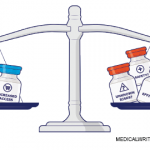Several major health plans have recently enacted policies regarding coverage status for Remicade (infliximab) and its biosimilars, Inflectra (infliximab-dyyb) and Renflexis (infliximab-abda). Most of these plans are limiting coverage for the biosimilar products to very specific circumstances. Some have also begun denying claims for biosimilars and instructing patients to switch to Remicade. The plans implementing these policies include Cigna, Humana, United Healthcare and several Blue Cross and Blue Shield companies. Members should refer to each plan’s coverage policy for additional information including exceptions criteria.
The ACR is actively reviewing this issue and will continue to advocate for coverage policies that allow providers to choose the most clinically appropriate treatment for each individual patient.
If you have questions regarding these policies or other insurance coverage concerns, contact [email protected].



